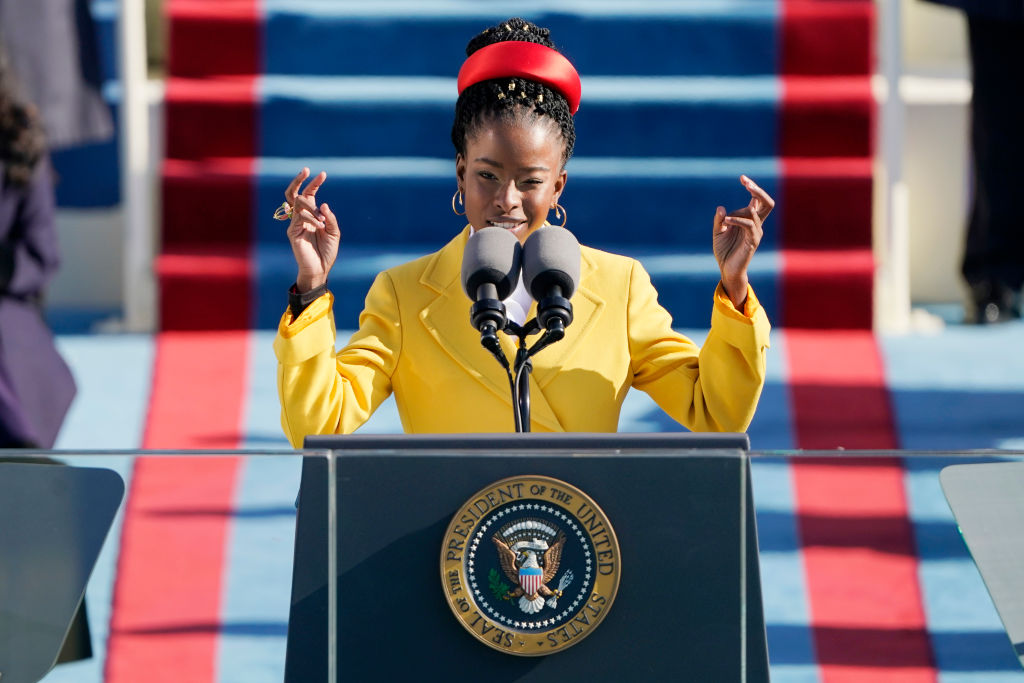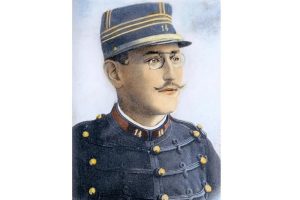Congratulations to Amanda Gorman, who is, at 22, the youngest ever poet for the inauguration of a US president. She stole the show with her style and poise — fabulous look, tremendous assurance. The pundits are united in their view that a Star Is Born; Michelle Obama has given her imprimatur; ditto Oprah.
Trouble is the actual poem.
Amanda was given the theme of America United. ‘The Hill We Climb’ is the result. Without pretending to be in the F.R. and Queenie Leavis league when it comes to literary sensibility, I couldn’t make sense of it. I mean, I got bits of it, I got the sentiment, I got the stream of consciousness, the emotion, I got the sub-Martin Luther King flow. But trying to make the whole thing cohere, structurally and grammatically — and in terms of sense — was another matter.
I may be wrong, of course, and willfully dim. God knows I get things wrong myself. Maybe this is how poetry works now. But let me show you a little of what I mean. Here’s the text, with a few comments interspersed:
‘When day comes, we ask ourselves, where can we find light in this never-ending shade?
The loss we carry. A sea we must wade.
(How does ‘The loss we carry. A sea we must wade’ follow from the first line about finding light, unless it’s simply to make ‘wade’ rhyme with ‘shade’?)
We braved the belly of the beast.
(Eh?)
We’ve learned that quiet isn’t always peace, and the norms and notions of what ‘just’ is isn’t always justice.
And yet the dawn is ours before we knew it.
Somehow we do it.
Somehow we weathered and witnessed a nation that isn’t broken, but simply unfinished.
(Alliteration — ‘weathered and witnessed’ — doesn’t mean the two verbs make sense or work together.)
We, the successors of a country and a time where a skinny Black girl descended from slaves and raised by a single mother can dream of becoming president, only to find herself reciting for one.
(This is a weird sentence. You get the gist, of course. But where does the ‘We’ that begins the line go in search of a verb? If the sentence began with ‘a skinny black girl…can dream of becoming president, only to find herself…’ it could sort of work. But following on from the ‘We, the successors…’ it doesn’t. Sorry.)
And, yes, we are far from polished, far from pristine, but that doesn’t mean we are striving to form a union that is perfect.
(What’s with the ‘but’ here? Maybe ‘for we are not striving’? Dunno.)
We are striving to forge our union with purpose.
(Shouldn’t it be a comma, to make sense of the next infinitive, ‘to compose…’?)
To compose a country committed to all cultures, colors, characters and conditions of man.
And so we lift our gaze, not to what stands between us, but what stands before us.
We close the divide because we know to put our future first, we must first put our differences aside.
We lay down our arms so we can reach out our arms to one another.
We seek harm to none and harmony for all.
Let the globe, if nothing else, say this is true.
(The globe? The world, surely? And let’s lose the full stop so the next line follows.)
That even as we grieved, we grew.
That even as we hurt, we hoped.
That even as we tired, we tried.
That we’ll forever be tied together, victorious.
Not because we will never again know defeat, but because we will never again sow division.
Scripture tells us to envision that everyone shall sit under their own vine and fig tree, and no one shall make them afraid.
If we’re to live up to our own time, then victory won’t lie in the blade, but in all the bridges we’ve made.
That is the promised glade, the hill we climb, if only we dare.
It’s because being American is more than a pride we inherit.
It’s the past we step into and how we repair it.
We’ve seen a force that would shatter our nation, rather than share it.
Would destroy our country if it meant delaying democracy.
And this effort very nearly succeeded.
But while democracy can be periodically delayed, it can never be permanently defeated.
(This refers to the incursion of extremists into Congress, which took place while our poet was at work. But while the lines from ‘We’ve seen a force…’ try for grandiosity, they collapse with the mundane ‘this effort very nearly succeeded.’ The lines don’t hang together.)
In this truth, in this faith we trust, for while we have our eyes on the future, history has its eyes on us.
This is the era of just redemption.
We feared at its inception.
We did not feel prepared to be the heirs of such a terrifying hour.
But within it we found the power to author a new chapter, to offer hope and laughter to ourselves.
So, while once we asked, how could we possibly prevail over catastrophe, now we assert, how could catastrophe possibly prevail over us?
We will not march back to what was, but move to what shall be: a country that is bruised but whole, benevolent but bold, fierce and free.
We will not be turned around or interrupted by intimidation because we know our inaction and inertia will be the inheritance of the next generation, become the future.
(You could just about get away with declaiming all this at a rally…but as poetry?)
Our blunders become their burdens.
But one thing is certain.
If we merge mercy with might, and might with right, then love becomes our legacy and change our children’s birthright.
(‘changes’, no?…is the subject ‘we’ or ‘love’?)
So let us leave behind a country better than the one we were left.
Every breath from my bronze-pounded chest, we will raise this wounded world into a wondrous one.
(Stop it right there. Does this sentence hang together? If it went from ‘every breath…’ to ‘will raise this wounded world’ it might make sense. If it started with ‘we will raise this wounded world’ it might make sense. But can our poet make her mind up about what’s doing the raising of this wounded world?)
We will rise from the golden hills of the West.
We will rise from the windswept Northeast where our forefathers first realized revolution.
We will rise from the lake-rimmed cities of the Midwestern states.
We will rise from the sun-baked South.
We will rebuild, reconcile, and recover.
And every known nook of our nation and every corner called our country, our people diverse and beautiful, will emerge battered and beautiful.
When day comes, we step out of the shade of flame and unafraid.
The new dawn blooms as we free it.
For there is always light, if only we’re brave enough to see it.
If only we’re brave enough to be it.’
This kind of poetry and this kind of emotional declamation and all the intermittently dramatic diction are very much the stuff of contemporary poetry recitals. But once you stop being uplifted by the authenticity of the emotion and the beauty of the speaker and actually try to get your head round the syntax and the sense, you just have to give up.
The thing about Martin Luther King’s diction — and he was an orator, not poet — was that it was sonorous, beautiful and rousing but it also made grammatical sense. His sentences hung together. This poem falls down on both counts.
Take the poem away from the moment of delivery and look at the actual text, and ‘The Hill We Climb’ turns out, I think, to be just a bit rubbish.
This article was originally published on The Spectator’s UK website.


















